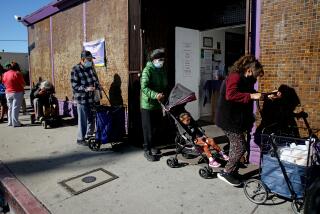Mayors’ Group Calls Housing, Food Inadequate in Many Cities : Survey Finds Needs of Poor on the Rise
- Share via
WASHINGTON — Demand for low-income housing and food for the needy grew substantially this year in a majority of 25 large cities nationwide, the U.S. Conference of Mayors reported Thursday.
A survey by the conference found that the need for housing soared an average of 40%, and food needs increased 25% in most of the cities.
“It is clear that conditions are worsening for people who need our help to feed themselves and their families, for people who need our help to shelter themselves and their families, for people who live in poverty,” said Joseph P. Riley Jr., mayor of Charleston, S.C., and president of the conference.
Boston Mayor Raymond L. Flynn, chairman of the conference task force on hunger and homelessness, called the situation “a growing national scandal” that is “embarrassing to the United States among the nations of the world.”
Both mayors appeared at a news conference to discuss the report, which provides voluminous data on urban homelessness, poverty, hunger and low-cost housing, issues that will be debated hotly in the next session of Congress.
Housing Applications Halted
The survey noted that the waiting list for public housing is so long that 17 of the cities, including Los Angeles, have stopped taking applications.
In Los Angeles, where the average wait for public housing is 18 months, an aide to Leila Gonzalez-Correa, executive director of the city’s housing authority, said that the waiting list was opened for a few days last summer, the first time in three years, and that 5,000 telephone calls poured in. Opening the lists year-round would “give applicants false hopes,” said the aide, adding that the authority would be unable to handle the calls.
The housing problem is long-term, the report said, noting that “over the last five years, the safe, decent and affordable housing stock available to low- and moderate-income households decreased” in 13 of the 25 cities in the survey and remained the same in four. Many housing units were eliminated by urban development and others became uninhabitable because of deterioration.
The report blames cuts in federal assistance to housing, which, Flynn charged, has been “slashed dramatically” under the Reagan Administration. He said that federal spending for low-income housing has been cut from $33 billion in fiscal 1981 to less than $10 billion in fiscal 1986.
‘Enormously Expensive’
At the Department of Housing and Urban Development, which administers the housing assistance programs, a spokesman said that the “primary reason for the cuts was the elimination” of a program that built new housing and rehabilitated existing housing. The program was eliminated because it was “enormously expensive,” said the spokesman, who added that it cost from $60,000 to $70,000 to construct each new housing unit.
As for hunger, the report said that, in 16 of the cities surveyed, including Los Angeles, assistance centers must turn away people who need food. Most cite inadequate food supplies and insufficient staff as reasons.
The mayors’ group said that most of the cities expect the problems to get worse and urged swift action.
Flynn predicted that, when the public becomes aware of the magnitude of the problems outlined in the report, it will respond “with such outrage and such indignation” that Congress and the Administration will be pressured into restoring funds cut from social programs under President Reagan.
At a Nov. 20 news conference, Reagan said that his Administration is “spending more than has ever been spent before, trying to help the needy.” The President added that “many of these programs are being undertaken by the state and the local level and with the aid of federal financing.”
More to Read
Get the L.A. Times Politics newsletter
Deeply reported insights into legislation, politics and policy from Sacramento, Washington and beyond. In your inbox twice per week.
You may occasionally receive promotional content from the Los Angeles Times.










